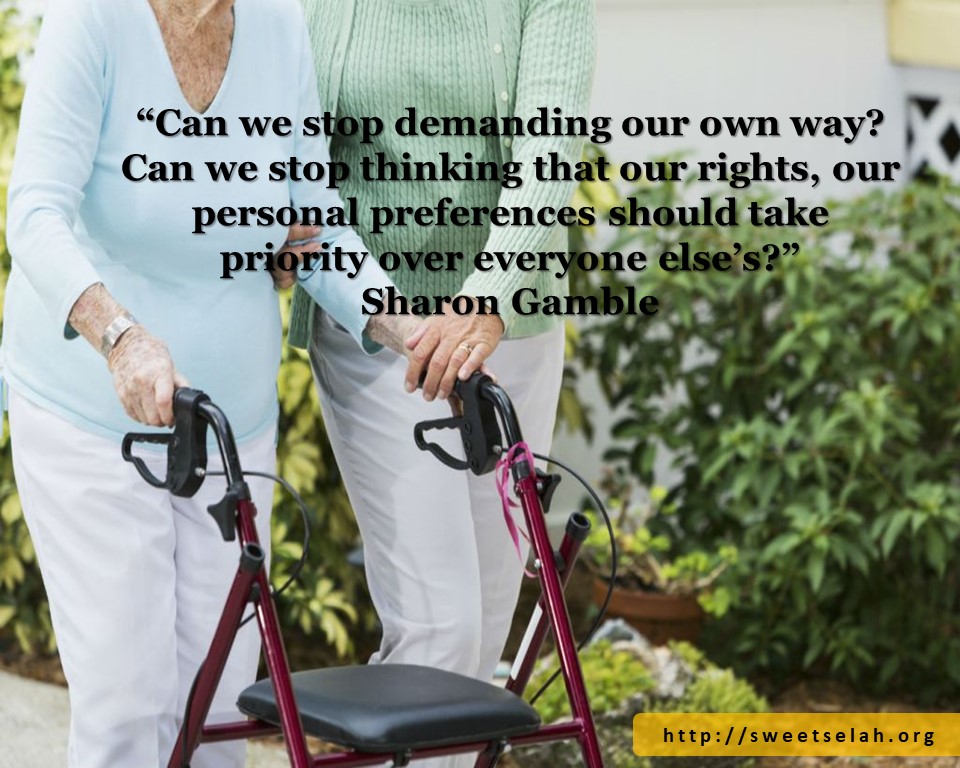
Love is not jealous or boastful or proud or rude. It does not demand its own way. —1 Corinthians 13:4b-5a (NLT)
We start demanding our own way quite early in life. As infants, when our tummies are hungry, we bellow until we’re fed. We cry if we’re uncomfortable in any way and want to be soothed. As toddlers, we melt down when we’re handed the red cup when, of course, we wanted the blue one. We grab toys out of others’ hands and stuff that extra cookie in our mouths before anyone can stop us. Yes, we’re a sad and selfish lot from the very beginning, aren’t we? Now, granted, infants really don’t have any other viable way to express themselves when something is wrong, so we’ll cut them some slack. And … toddlers are still learning that other people have feelings and wants, too. We expect them to be selfish, and we work hard training them to be otherwise.
However, this demanding our own way doesn’t stop when we get older. Oh, we’re more subtle about it. We accept that we’ll be uncomfortable at times, and we normally don’t throw fits when we’re given a cup of tea in the wrong mug. We don’t have screaming rages in the grocery store if we can’t buy our favorite treat. However, we can be short and rude to the store clerk who informs us that they are out of the one ingredient we need to make the family recipe for Thanksgiving dinner. We can make our family members quite miserable with a sulk when we’re thwarted in some delightful plan we had been planning.
When I look back at some of the quarrels in my life, I shake my head in amazement. How did I get so worked up over which way we ought to drive to the mall? Why was it so important that we stay at my parents that extra hour when it was so clear my introverted husband was suffering? Was it really necessary to breeze right by that car trying to enter traffic from the side street? In short … why do I still demand my own way so often?
Here’s our lesson today. Love doesn’t demand its own way. Love sees the other person. Love wants to bless others, even at one’s own expense. Now, that doesn’t mean we all walk around with no opinions. It doesn’t mean we shouldn’t share our likes and dislikes. It simply means we don’t demand that everything in the universe move in such and such a way as to never inconvenience us. It means, as Paul says so well in Philippians 2:4 that we should “look out not only for [our] own interests, but also for the interests of others” (NKJV).
So let’s practice. When someone wants to pull out in front of us in traffic? Can we wave them forward with a smile? When we’re offered the smallest piece of delectable cake, can we be grateful and not irritated? When our husband or a friend suggests the place to go out for dinner, can we be content with their choice? When someone is short-tempered with us, can we respond with kindness and hide our irritation? Can we stop demanding our own way? Can we stop thinking that our rights, our personal preferences should take priority over everyone else’s? Can we let others go first?
Oh, how I want to be better at all this. After all, look at our great example, Jesus Christ. He left Heaven, for crying out loud, with all its joy and beauty and glory. He took on flesh and felt the weight of it. He chose sorrow, suffering, and betrayal. He slept on the ground, had no home of his own, and walked everywhere He went. He reached out to people, talked with them, healed them, even to the degree that He frequently had no time to eat. They just kept coming. When He tried to get away, the crowds usually followed, and His response was not irritation but compassion. Ultimately, He chose crucifixion, not demanding His own way—although He was clear in the Garden of Gethsemane that He did not want this way of the cross if there were any other way. He submitted Himself to the torture of the cross for our good. Love does not demand its own way.
Oh, Father, sometimes I regret to see how much I still resemble my toddler self. Forgive me when I love me far more than I love others. Help me to see others’ needs and delight in serving. Help me to express my own needs gently, not demanding that I should reign supreme in every decision. Oh, Jesus! I want to be more like You! In Your Name I ask this, Amen.

You are loved,
Sharon
Sweet Selah Ministries
Vision
To encourage a movement away from the belief that “busy is better”
and toward the truth that stillness and knowing God matter most—
and will be reflected in more effective work and service
Mission
To offer resources and retreats that help women pause (Selah)
and love God more deeply as they know Him more intimately (Sweet)
Donate
If you’ve been blessed, keep the blessing going!
Click over to our Donation page … and thanks.
Share it. Pin it.




